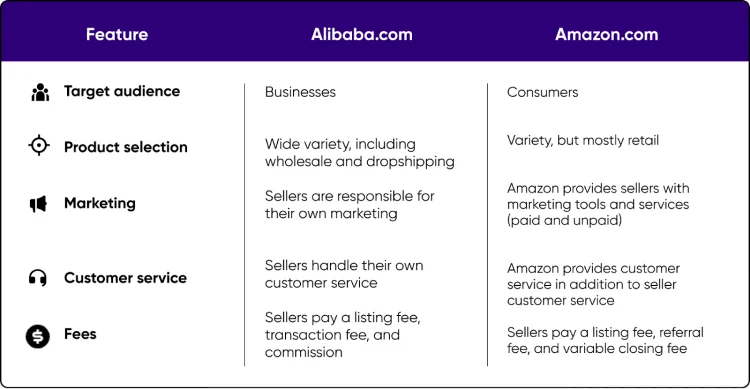In the Amazon marketplace, where millions of sellers vie for the same customers, diversifying your approach is essential for sustained growth. And while there are many ways to diversify, one favorable approach is to not stay solely locked into Amazon’s ecosystem.
Amazon sellers seeking expansion opportunities should consider selling on Alibaba.com, a global B2B marketplace boasting an impressive 1.6 billion listed products. This platform opens doors to a diverse customer base, including businesses not currently engaged on Amazon.
In this blog, we’ll explore the benefits and considerations for Amazon sellers looking to make the move onto the Alibaba platform.
Benefits of Selling on Alibaba.com for Amazon Sellers
For sellers who’ve only spent time in Amazon’s ecosystem, Alibaba offers vast potential as a marketplace with 190 million buyers in more than 200 countries and regions. Why stay in one large bay when there’s an ocean of opportunity available for your business to explore?
You’ll enjoy a competitive advantage too, as Alibaba is a wholesale marketplace, meaning you can source products at much lower prices than you would on Amazon, and pass those savings along to offer more competitive prices to potential buyers.
Given the size of the marketplace, potential sellers might worry about consistent and reliable supply standards and shipping, but Alibaba keeps strict supplier standards with tight quality control, so sellers can be confident that the right goods are getting into the hands of buyers.
On the shipping side, Alibaba has more shipping options than some Amazon sellers might be used to, but that flexibility includes direct shipping to Amazon FBA warehouses, meaning you can get the best of both worlds and rest easy knowing your customers can receive your products quickly and easily.
Transitioning to Using Alibaba.com for Amazon Sellers
When considering the transition from Amazon to Alibaba.com, there’s a little bit of the familiar as well as its own particular standards and practices. Here’s a look at a few of the key differences between the two that can impact your selling experience.

Compared to Amazon, Alibaba gives sellers both more leeway and more responsibility for shipping, marketing, and managing customer service. So, a key decision for businesses looking to scale and enter this marketplace will be how much capacity you have to manage these aspects of your business without Amazon’s tools and services.
Amazon and Alibaba: Best Practices for Selling
Let’s assume you’ve decided to make the move onto Alibaba. Many of the best practices that have set you up for success on Amazon will carry over to Alibaba, but you will also find certain optimizations to your practices will be required to get the most out of the platform. Here are some tips to get you prepped for success.
1. Conduct Market Research
Alibaba and Amazon have different target audiences, so take time to understand whether Alibaba fits your particular business niches. As with entering any new market space, take the time to conduct a competitive analysis to pinpoint in-demand products and set competitive prices that resonate with buyers, making sure the resources you expend will be worth the effort.
2. Optimize Listings for Search Engines
Since Alibaba is a dual-language platform – both Chinese and English – to maximize your opportunities, you’ll want to localize for keyword opportunities in both languages. Just like Amazon listing optimization, you’ll want to incorporate relevant keywords into titles, descriptions, and images to enhance discoverability. You’ll just want to do it in two languages instead of one.
You can also choose to optimize only in English, but you’ll be leaving profit opportunities behind, which we don’t recommend.
3. Offer Competitive Prices
In the wholesale landscape of Alibaba.com, offering competitive pricing is a pivotal factor in attracting buyers. In general, it’s a more expensive marketplace than Amazon (in part due to its business-oriented target audience), so you might need to make adjustments to ensure your pricing is compelling within the marketplace. It’s not a drawback per se, merely a difference that could necessitate adjustments to market strategy.
4. Prioritize Exceptional Customer Service
With Alibaba, customer service is on you, which means that you can decide to make this a competitive differentiator that helps you rise above other sellers. Elevate your customer service standards by promptly addressing inquiries, efficiently resolving issues, and consistently delivering a positive shopping experience.
Learn more about creating a “6-Star” customer experience in our interview with Amazon expert Tomer Rabinovich here:
The Power of Diversifying Your Ecommerce Strategy
In the fiercely competitive ecommerce landscape dominated by Amazon, diversification is key to ensuring long-term success. Relying solely on this platform can be risky.
Selling on Alibaba.com represents a promising avenue for Amazon sellers seeking to expand their horizons and tap into uncharted customer segments. Whether you’re already a seasoned Amazon seller or just starting your ecommerce journey, Alibaba.com could be the key to unlocking new growth opportunities and new levels of success.




